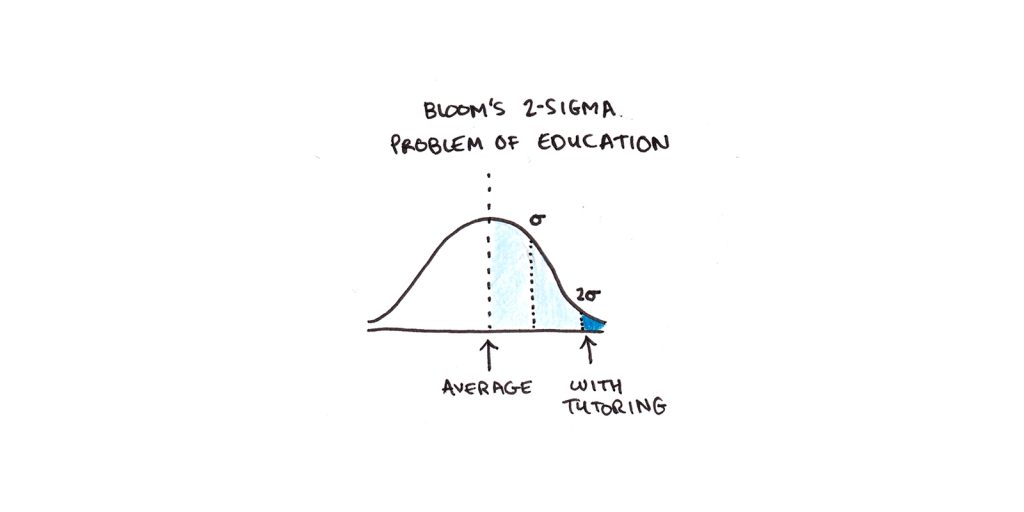One-on-one tutoring is one of the most effective ways to learn anything. In his famous paper on the “2 sigma problem” in educational research, Benjamin Bloom called for a search for group teaching interventions that approximated the efficacy of tutoring:
However, the most striking of the findings is that under the best learning conditions we can devise (tutoring), the average student is 2 sigma [standard deviations] above the average control student taught under conventional group methods of instruction.
…
This is the “2 sigma” problem. Can researchers and teachers devise teaching-learning conditions that will enable the majority of students under group instruction to attain levels of achievement that can at present be reached only under good tutoring conditions?
Bloom later argues that mastery learning, the idea that students should fully master prerequisite knowledge before moving on to later subjects, comes close to this ideal. However, a simple conclusion can be drawn from this work: tutoring is quite effective, and we all should be using it more.

What is Tutoring Good For?
One myth about tutoring is that it is essentially only for “slow” students. This was the response from a reader when I suggested tutoring might be effective for learning academic subjects. He saw tutoring as a response to some kind of deficiency, something for kids who couldn’t properly learn in class and had to use it to catch up.
Some of this myth may simply be an abuse of language. “Tutoring” is what we give to students needing extra help. “Coaching” or “mentoring” is what give to those being groomed for elite performance. Yet there doesn’t seem to be a functional difference between the terms.
Intellectual skills are just as amenable to coaching as are physical ones. Terrence Tao, widely considered to be the most brilliant living mathematician, was tutored heavily from a young age. Here is a photo of him at ten with the legendary Hungarian mathematician Paul Erdos.

Nearly every elite performer in chess, music, medicine, business and elsewhere had enormous quantities of coaching support. Tutoring is far from remedial. Instead, it’s the secret sauce of top performance.
What if I Can’t Afford Tutors?
Price is the big objection to tutoring. Admittedly, this can be a real cause for concern. The cost of one-on-one instruction was a major reason Bloom formulated the 2 sigma problem, to see if cheaper means of achieving tutored-levels of efficacy were possible.
Yet, there are many reasons to believe tutoring is underutilized, even for its cost.
For starters, tutoring is often free. Many universities have free tutoring services available. Be sure to check if your school offers academic assistance. You’ve already paid for it with your tuition, so a failure to use it can’t be blamed on a lack of resources.
Even if your school doesn’t have free tutoring programs, most classes have office hours with professors or teaching assistants where you can ask questions. This is a great opportunity to maximize the value of your studying time so that you can clear up misconceptions and confusion.
Finally, tutoring needn’t be extensive to be valuable. If you’re an organized student and study well independently, you can still use tutoring for the problems you can’t get through on your own. I argue in favor of the Feynman Technique to work through difficult conceptual hurdles and find the holes in your understanding. Still, even here, you need to get clear explanations once you’ve identified those questions. Tutoring is an excellent way to do this.
Tutoring, Beyond School
Professionals could use more tutoring than they realize. Having access to high-quality feedback on your work is essential for growth. Yet most of us labor away with minimal guidance or development.
About a year ago, I decided to start working with an editor when writing blog posts. I came to this decision after having worked with one when writing my book. Beyond correcting typos and fixing sentences, I found that working with an editor made a big improvement in the quality of my writing.
Yet I think we avoid tutoring in our working lives for much the same reason we avoid it as students. Help is what the poor performers need. I know what I’m doing, so why bother?
As I grow older, I’ve become increasingly convinced that the attitude required for learning is not confidence but humility. We stop learning not because we don’t believe we can learn but because we think we already know what is best.


 I'm a Wall Street Journal bestselling author, podcast host, computer programmer and an avid reader. Since 2006, I've published weekly essays on this website to help people like you learn and think better. My work has been featured in The New York Times, BBC, TEDx, Pocket, Business Insider and more. I don't promise I have all the answers, just a place to start.
I'm a Wall Street Journal bestselling author, podcast host, computer programmer and an avid reader. Since 2006, I've published weekly essays on this website to help people like you learn and think better. My work has been featured in The New York Times, BBC, TEDx, Pocket, Business Insider and more. I don't promise I have all the answers, just a place to start.